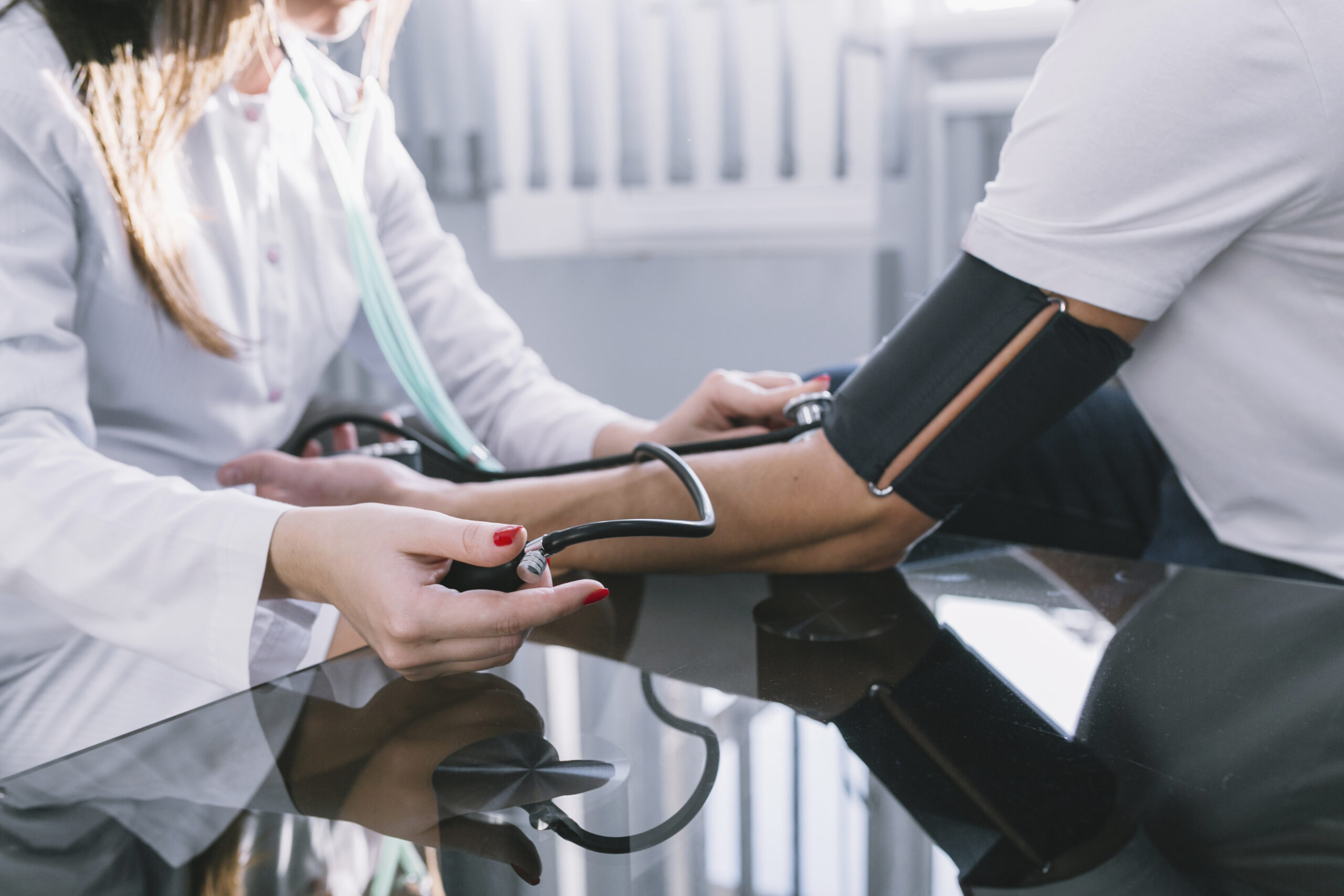Millions of individuals throughout the world suffer from hypertension, also known as high blood pressure. Though it’s sometimes called the “silent threat,” it poses a major risk to health since, in its early phases, it rarely shows any signs. Frequent examinations are essential for early discovery and therapy because there are no warning signals present.
High Blood Pressure Classifications
Good blood pressure is defined as 120/80 mmHg or less, according to the American Heart Association (AHA). This is an explanation of the classification system for blood pressure:
| Blood Pressure Category | Description |
|---|---|
| Normal | Less than 120/80 mmHg |
| Elevated | Systolic 120-129 and diastolic below 80 mmHg (prehypertension) |
| Stage 1 Hypertension | Diastolic 80-89 mmHg or systolic 130-139 mmHg |
| Stage 2 Hypertension | Systolic 140/90 mmHg or higher |
- Extremely high blood pressure readings, like those above 180/120 mmHg, require immediate medical attention. Don’t hesitate to call emergency services if you experience this.
- Uncontrolled high blood pressure can silently increase your risk of serious health problems down the road, such as heart attacks, strokes, and even kidney issues.
- Early detection is key! Get your blood pressure checked by your doctor regularly. Most adults should aim for at least one checkup every two years, starting at 18. Depending on your health, your doctor might recommend more frequent monitoring.
DISCLAIMER: Expert medical advice should always be consulted before acting upon the material presented; it is solely intended for educational reasons. Kindly get advice from your physician regarding diagnosis and personalized treatment regimens. Instead of being a naive believer, be an informed person.
Causes of high blood pressure:
Even while the precise cause of primary hypertension, or high blood pressure, is occasionally unknown, several variables might greatly raise your risk:
Lifestyle Choices:
Unhealthy Diet: Eating too much salt (sodium), not enough fruits and vegetables, and unhealthy fats can all raise blood pressure.
Physical Inactivity: Getting regular exercise helps control blood pressure and weight. Living a sedentary lifestyle raises the danger.
Smoking: Smoking causes blood pressure to rise and blood vessels to be damaged.
Overindulgence in Alcohol: Consuming alcohol in excess can raise blood pressure.
Medical Conditions:
Obesity: Carrying too much weight increases blood pressure and strains the heart.
Diabetes: Diabetes can alter blood pressure regulation and cause blood vessel damage.
Kidney Disease: Blood pressure is regulated by healthy kidneys. When they’re not working correctly, blood pressure levels may increase.
Sleep apnea: This sleep apnea disorder can cause breathing difficulties, which can elevate blood pressure.
Extra Risk Elements:
Family History: Your risk is increased if you have a close family who has high blood pressure.
Age: As people age, their risk of high blood pressure often rises.
Symptoms of high blood pressure:
The fact that high blood pressure, or hypertension, is frequently undiagnosed is one of the main problems with it. It is sometimes referred to as the “silent threat” since, in contrast to many other medical disorders, it rarely exhibits symptoms in its early stages. This highlights how crucial it is to see your doctor frequently to detect high blood pressure early and avoid problems.
On the other hand, extremely high blood pressure (usually more than 180/120 mmHg) might occasionally present with some clear warning indicators:
Symptoms of Extremely High Blood Pressure (Usually Above 180/120 mmHg)
| Symptom | Description |
|---|---|
| Severe Headaches | Throbbing or pulsating headaches that can occur anywhere in the head |
| Blurred Vision | Difficulty seeing clearly or experiencing temporary vision changes |
| Chest Discomfort | Tight or crushing chest pain that may resemble angina or a heart attack |
| Breathing Difficulties | Shortness of breath or difficulty catching your breath (dyspnea) |
| Vomiting or Nausea | Feeling sick to your stomach or throwing up |
| Anxiety or Confusion | Unusual feelings of anxiety or confusion |
| Ear Buzzing | Persistent or intermittent ringing or whooshing sound in the ears |
| Nosebleeds | Sudden nosebleeds |
High blood pressure treatment:
A cooperative effort between you and your physician is essential to controlling high blood pressure. They’ll keep an eye on your development, make any necessary adjustments to your treatment plan, and listen to any worries you may have. Keep in mind that consistency is essential. You can successfully manage high blood pressure and have a long, healthy life by living a balanced lifestyle and doing as your doctor prescribes.
If you are at an early stage of high blood pressure, well… congrats you can manage it with lifestyle modification
- Embrace a heart-healthy diet: a well-balanced meal low in sodium is lucrative in high blood pressure. Give special attention to entire grains, fruits, vegetables, and lean protein sources. Reduce your intake of added sweets, bad fats, and processed foods. Blood pressure can be lowered with the help of the DASH (Dietary Approaches to Stop Hypertension) diet.
- Move Your Body Regularly: Blood pressure control is mostly dependent on regular physical activity. Aim for 150 minutes or more per week of moderate-to-intense activity or 75 minutes or more of vigorous exercise. Little increases in activity can have a significant impact.
- Keep Your Weight in Check: Carrying too much weight puts stress on your heart and blood vessels. Even a small amount of weight loss can have a big impact on blood pressure management.
- Handle Stress Effectively: High blood pressure may be a result of chronic stress. For successful stress management, experiment with relaxation methods like yoga, meditation, and deep breathing.
Sometimes controlling blood pressure with lifestyle changes alone isn’t enough. But no worries…To lower your blood pressure, your doctor could recommend certain medications. Certain medications function in different ways, such as assisting your kidneys in getting rid of extra salt from your body or relaxing blood vessels.
- Diuretics: By assisting your kidneys in eliminating extra fluid from your body, these drugs can help reduce blood pressure.
- ACE inhibitors (angiotensin-converting enzyme inhibitors): these are drugs that relax blood arteries by preventing the synthesis of a chemical that causes constriction.
- ARBs (angiotensin II receptor blockers): function similarly to ACE inhibitors but prevent the constriction of blood vessels by blocking the activity of an alternative chemical.
- Beta-blockers: These drugs lower blood pressure by slowing the heart rate and heart contraction force.
- Calcium channel blockers: These drugs cause your blood vessel walls’ muscles to relax, causing your blood vessels to enlarge and reduce blood pressure.
REMINDER: The information offered should not be used in place of expert medical advice; rather, it is meant purely for educational reasons. For a diagnosis and treatment plan tailored to your unique requirements, please see your physician. Be a thoughtful person rather than a naive believer.
What happens when BP is high?
Despite having no symptoms in the beginning, high blood pressure is a dangerous condition. It can significantly damage your body if left unchecked. Your arteries may get damaged due to the continuous strain of high blood pressure, which increases their vulnerability to blockages and decreases blood supply to essential organs. This may trigger a series of complications that include renal damage, heart disease, stroke, vision problems, and even cognitive decline. To stop these problems, early detection and treatment are essential. Do not forget that controlling your blood pressure and maintaining your health depend on routine examinations and medical advice.
What is normal blood pressure by age?
Recommendations for blood pressure can change slightly with age. Generally speaking, normal blood pressure is defined as less than 120/80 mmHg for persons 18 years of age and above. But the tale is not over yet.
Prehypertension: An increased chance of developing high blood pressure in the future may be indicated by readings between 120 and 129 systolic and less than 80 diastolic.
Individual Needs: Your optimum blood pressure range might be influenced by underlying medical issues as well as general health.
Seeing a doctor is crucial. Frequent examinations enable them to evaluate your unique circumstances and establish a healthy target range for you. Maintaining your blood pressure and averting further health issues require early detection and treatment.
Which disease causes high blood pressure?
Hypertension, another name for high blood pressure, is not necessarily brought on by a single specific illness. Many times, primary hypertension has no identified cause. Nonetheless, several illnesses can raise your chance of getting high blood pressure:
Diabetic Nephropathy: An essential function of healthy kidneys is blood pressure regulation. When they’re not working correctly, the body may get electrolytes and fluid out of balance, which raises blood pressure.
Diabetes: This long-term illness has an impact on blood sugar regulation. Blood arteries may become less elastic and more damaged by diabetes, which may increase blood pressure.
Sleep Apnea: Snoring fits throughout the night are a symptom of sleep apnea, a sleep disorder. Elevated blood pressure may arise due to the oxygen variations and physical stress that ensue.
Thyroid Disorders: An imbalance of hormones and blood pressure regulation can result from both an underactive thyroid (hypothyroidism) and an overactive thyroid (hyperthyroidism).
Atherosclerosis: An increase of plaque in the arteries causes them to narrow and become more resistant to blood flow, which raises blood pressure. This condition is known as atherosclerosis.
What is Stage 2 hypertension?
The severity of high blood pressure is divided into two categories using the stage 2 hypertension categorization method. In comparison to previous phases, it denotes a more serious degree. This is an explanation:
Blood Pressure Readings: When your blood pressure consistently measures at or above 140/90 mmHg, you are diagnosed with stage 2 hypertension.
Enhanced Dangers to Health: When comparing Stage 2 hypertension to Stage 1 hypertension (readings between 80-89 diastolic or 130-139 systolic), there is a marked increase in the likelihood of experiencing health issues associated with high blood pressure. Among these difficulties are:
Heart disease (angina, heart attack, heart failure)
Stroke
Kidney damage
Eye problems
Cognitive decline

